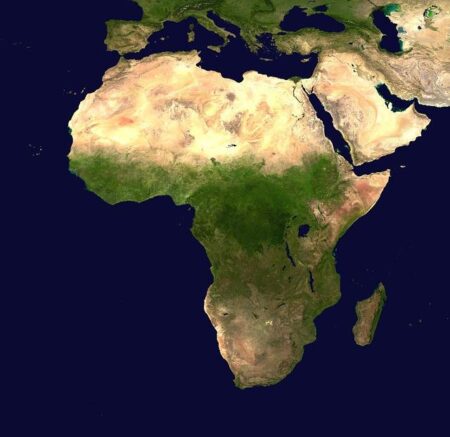In a significant development for telecommunications in Africa, Niger has officially become the latest African country to gain access to Elon Musk’s Starlink satellite internet service. This milestone not only promises to enhance internet coverage in one of the region’s most underserved markets but also reflects the growing trend of satellite technology as a viable solution to bridge the digital divide across the continent. As nations grapple with challenges in connectivity and access to facts,starlink’s arrival could catalyze economic growth,improve educational opportunities,and transform various sectors reliant on stable internet infrastructure. In this article, we will explore the implications of Starlink’s expansion into Niger, the anticipated benefits for its citizens, and the broader impact on the African telecommunications landscape.
Niger’s Digital Transformation Accelerated by starlink Deployment
The recent launch of Starlink in Niger marks a significant turning point for the country’s digital landscape, enabling vast improvements in internet connectivity.With Elon Musk’s satellite internet service,Nigeriens can expect enhanced access to crucial online resources,educational platforms,and e-commerce opportunities. This initiative paves the way for various sectors to modernize and thrive, helping to narrow the digital divide in a nation where conventional internet infrastructure has been limited.
This deployment not only fosters greater connectivity but also encourages various stakeholders to harness the power of the internet for development.Key advantages include:
- Increased bandwidth: Starlink provides faster internet speeds, facilitating seamless interaction and data transfer.
- Rural coverage: The satellite system reaches remote areas, bringing online services to underserved populations.
- Economic growth: Improved internet access can stimulate entrepreneurship and attract investment in the digital economy.
- Education advancement: Students can access online learning materials, broadening their educational horizons.
| Impact Area | Expected Outcomes |
|---|---|
| Business | Enhanced digital commerce opportunities |
| Education | Greater access to learning resources |
| Healthcare | Improved telemedicine services |
| Government | Streamlined e-governance applications |

Impact of satellite Internet on Niger’s Connectivity and Economic Growth
The introduction of satellite internet services, specifically through platforms like Elon Musk’s Starlink, marks a significant turning point for Niger’s connectivity landscape. This technology offers high-speed internet access to regions that traditional infrastructure has historically neglected, paving the way for improved communication and information dissemination. With an emphasis on rural and underserved areas, Niger stands to benefit from enhanced connectivity that can lead to various advancements, enabling locals to participate more fully in the digital economy. Key benefits include:
- Increased Access: Villages and remote locations gain internet access, equalizing opportunities.
- Enhanced Education: Students can access online resources and e-learning platforms, improving educational outcomes.
- Business Opportunities: Local entrepreneurs can reach broader markets and clients via digital platforms.
Moreover, the economic implications are profound. By bridging the digital divide, Nigerian businesses can innovate and engage in e-commerce, wich can significantly stimulate economic growth.the capacity for telemedicine,remote work,and online education can elevate quality of life and productivity levels across various sectors.The following table illustrates some potential areas of impact:
| Sector | Potential Impact |
|---|---|
| Education | Access to online learning materials, reducing dropout rates. |
| Agriculture | Real-time weather updates and market information to boost yields. |
| Healthcare | Telehealth services can improve rural health outcomes. |
| Small Businesses | online presence leading to increased sales and visibility. |

Challenges Facing Starlink’s implementation in Niger
As Niger embraces the arrival of Starlink’s satellite internet service, it faces a myriad of challenges that could hinder successful implementation. Infrastructure inadequacies remain a significant barrier, as many regions lack the reliable electricity and telecommunications frameworks necessary to support advanced satellite technology. The rural and remote areas, often the primary target for such services, struggle with inconsistent power supplies, which could undermine user experience. Moreover, there are concerns about the affordability of service, as the initial costs associated with equipment and subscriptions may be prohibitive for many citizens.
Another pressing issue is the government regulatory landscape that may complicate operations.Starlink must navigate local regulations and potential bureaucratic hurdles, which can delay deployment and affect service reliability. The company also needs to consider the digital literacy levels across the population; many potential users may not be familiar with high-tech solutions or how to utilize internet services effectively. Moreover, the risk of satellite interference in regions with natural obstacles, combined with political instability, could further complicate effective service delivery. The successful rollout of Starlink’s services will require a comprehensive approach to addressing these multifaceted challenges.

Regulatory Framework: Ensuring a Smooth Integration of Starlink Services
The arrival of Starlink services in Niger marks a significant advancement in the country’s digital infrastructure,but it comes with a complex regulatory landscape that must be navigated to ensure effective integration. The Nigerian government, recognizing the importance of facilitating technological bridges, has initiated a set of regulations aimed at streamlining the deployment of satellite internet services. These regulations encompass various aspects such as:
- Licensing Requirements: Ensuring that Starlink operates under appropriate governmental oversight.
- Compliance Standards: Adhering to national security and data privacy frameworks.
- Infrastructure Development: Collaborating with local authorities to enhance connectivity and support facilities.
This regulatory collaboration between Starlink and local agencies is pivotal in addressing concerns ranging from service accessibility to the safeguarding of user data, thereby laying a foundation for lasting digital growth.
Moreover, international frameworks play a crucial role in shaping the regulation of satellite services. Niger’s engagement with entities like the African Telecommunications Union (ATU) and the International Telecommunication Union (ITU) will enhance its ability to harmonize regulations with broader continental norms.A transparent dialog involving government officials, regulatory bodies, and stakeholders from the tech industry can guide the regulatory framework towards:
- Promoting Fair Competition: Creating a level playing field for all digital service providers.
- Fostering Innovation: Encouraging local tech startups to create new solutions that leverage satellite connectivity.
- ensuring User Protection: Instituting measures that prioritize consumer rights and data integrity.
With a robust regulatory framework in place, Niger is poised to optimize the benefits of Starlink services and ensure equitable access to high-speed internet across its population.
Future Prospects: How Starlink Can Revolutionize Education and Healthcare in Niger
The advent of Starlink in niger is poised to dismantle existing barriers to quality education and healthcare, particularly in remote areas. With high-speed internet access, educators can engage students through interactive online platforms, bringing world-class resources and skills training directly into the classroom. This technology will enable virtual classrooms, webinars, and educational content delivery systems that can transform traditional teaching methodologies. Furthermore, educators can collaborate with global institutions, creating robust exchange programs that enhance learning opportunities for students across the country.
In the healthcare sector, Starlink can facilitate telemedicine services that are critical in rural Niger, where access to medical professionals is limited. Healthcare providers can leverage this technology to consult with specialists, access real-time patient data, and provide timely care remotely. Patients will benefit from consultations without the need for extensive travel, reducing costs and enhancing healthcare accessibility. The synergy of improved connectivity and innovative healthcare solutions can substantially elevate health outcomes in Niger, leading to a more informed and healthier population.
Recommendations for Maximizing Benefits of Starlink for Local Communities
To fully harness the potential of Starlink’s satellite internet service in Niger, local communities should focus on establishing partnerships that promote digital literacy and access. by creating targeted educational programs, residents can improve their digital skills, enabling them to effectively use the internet for various purposes, such as online learning, remote work, and e-commerce.Additionally, fostering collaborations between local governments, NGOs, and tech companies can lead to initiatives that prioritize infrastructure improvements and create public Wi-Fi zones, ensuring that even those without personal devices can benefit from high-speed internet access.
Communities should also engage in outreach efforts to highlight the economic opportunities available through enhanced connectivity.By promoting entrepreneurship in sectors like agriculture, tourism, and tech, local residents can leverage the internet to expand their markets and reach a broader audience. Implementing community-based workshops and training can also provide individuals with the tools to develop online businesses, while partnerships with established startups can facilitate mentorship and support. This multifaceted approach will not only maximize the benefits of Starlink but also contribute to a robust digital economy in Niger.
In Retrospect
Niger’s recent integration of Elon Musk’s Starlink satellite internet marks a significant milestone in the ongoing expansion of high-speed internet access across Africa. This development promises to enhance connectivity in a region where reliable internet infrastructure has long been a challenge,potentially transforming various sectors including education,healthcare,and commerce.As Niger joins the growing list of African nations benefitting from this cutting-edge technology, it underscores a broader trend towards digital inclusion on the continent. Observers will be keen to monitor how this initiative unfolds and its implications for Niger’s socio-economic landscape in the years to come. As Starlink continues to roll out its services, the hope remains that increased connectivity will empower individuals and communities, fostering innovation and growth in the digital age.







